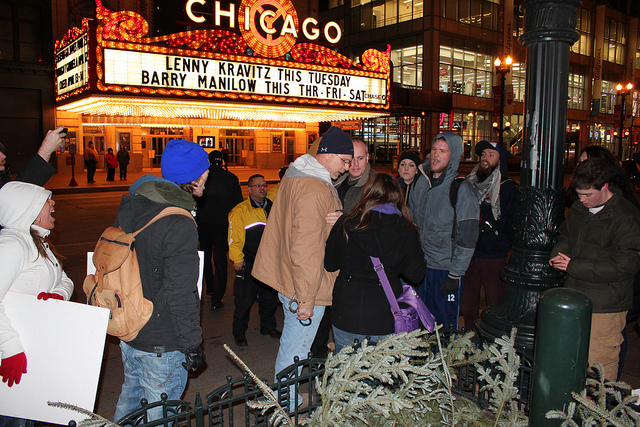Illinois House Kills Amended Eavesdropping Bill
By aaroncynic in News on Mar 22, 2012 2:00PM
Yesterday the Illinois House voted down a bill which would have made it legal to record on duty police officers in public spaces. With 59 nays, the House voted to kill HB 3944, which would have exempted people who make a “recording of a peace officer who is performing a public duty in a public place and speaking at a volume audible to the unassisted human ear” from an eavesdropping violation. Though that law was ruled unconstitutional by a Cook County judge earlier this month, Illinois still remains a “two-party consent” state, which means both parties must give consent to record, whether or not the space is public.
Rep. Elaine Nekritz, sponsor of HB 3944 said last month the bill was necessary because “the law has yet to catch up to the thousands of citizen journalists and others who witness events, pull out their smart phones, and press record.”
Its detractors, however, argued differently. The State Journal-Register reports Rep. Jim Watson said “We should not be creating an atmosphere where people enter this ‘got you’ mode and try to tape law enforcement, trying to catch them (doing things).” Rep. Dennis Reboletti said “Why should (the police) have to go get a court order to record these people when these people can record them?”
As various cases making their way through Illinois courts and other incidents show, it's not a simple matter of “gotcha” recording. The case Cook County Judge Stanley Sacks used to find the law unconstitutional involved Christopher Drew, a man recording his arrest of a separate crime, completely unaware of the eavesdropping penalties. 21-year-old Tiawanda Moore was acquitted of violating the law, even though she recorded two internal affairs officers she believed were attempting to dissuade her from filing a sexual harassment complaint against an officer. Most recently, an Occupy Chicago member streaming live video of a rally was threatened with arrest and felony charges for recording an altercation with police.
Each of these cases show that recording public servants while on the job isn't simply just a matter of “trying to catch them doing things.” In the case of Tiawanda Moore, the officers involved were possibly engaged in less than legal activity. With Christopher Drew, he intentionally participated in an act of civil disobedience to protest one law, but was charged with a much more serious crime he was unaware of. Keilah Becker of Occupy Chicago accused Chicago police of “yelling extremely sexist and verbally abusive comments” at her and later forceably deleting her footage of the altercation.
While each of these cases has a “he said, she said” nature to them, that was precisely the point the voted down legislation attempted to address. Chicago police officers already have cameras in their cars, and the city has the largest surveillance network in the United States. With all of these eyes already on the streets, criminalizing citizens for recording police activities in public seems like another way to keep public servants from being held accountable for their actions.
